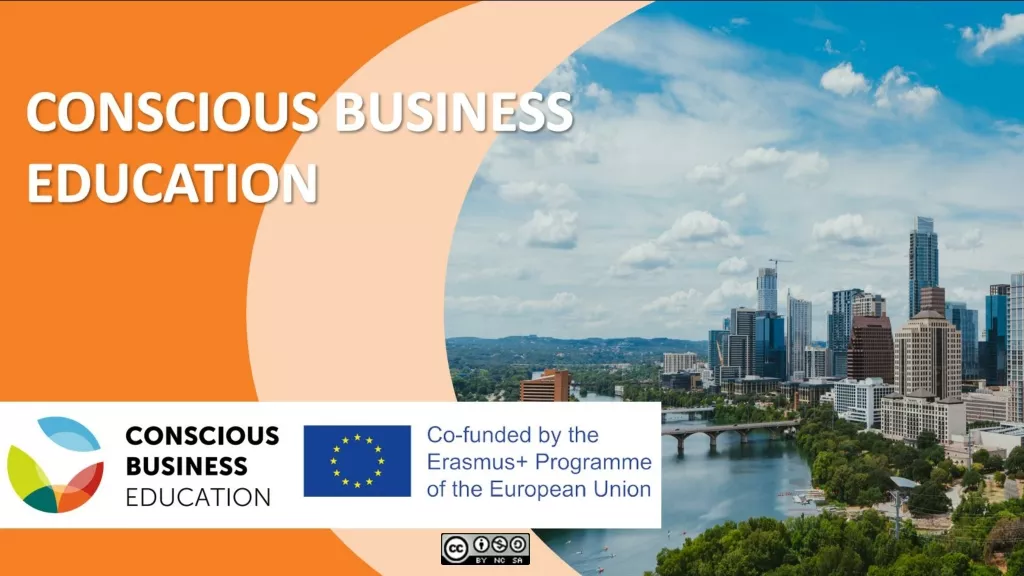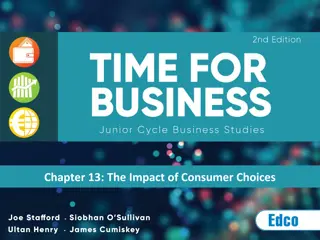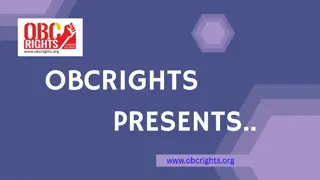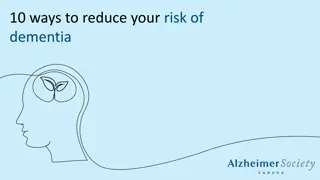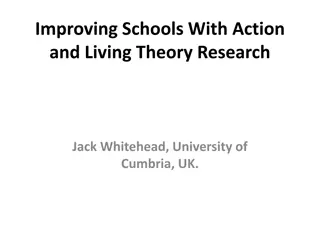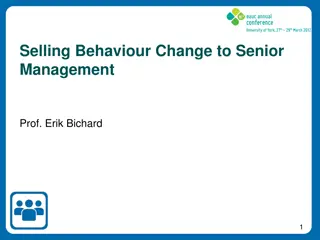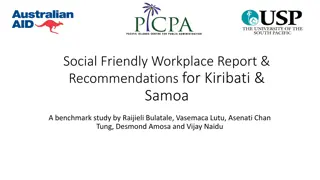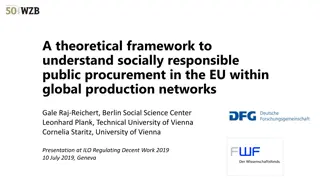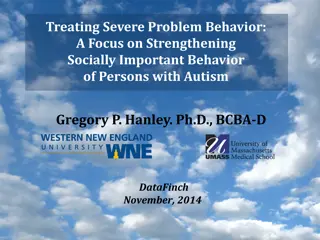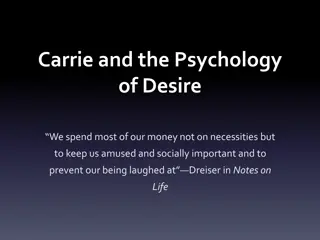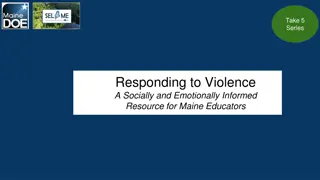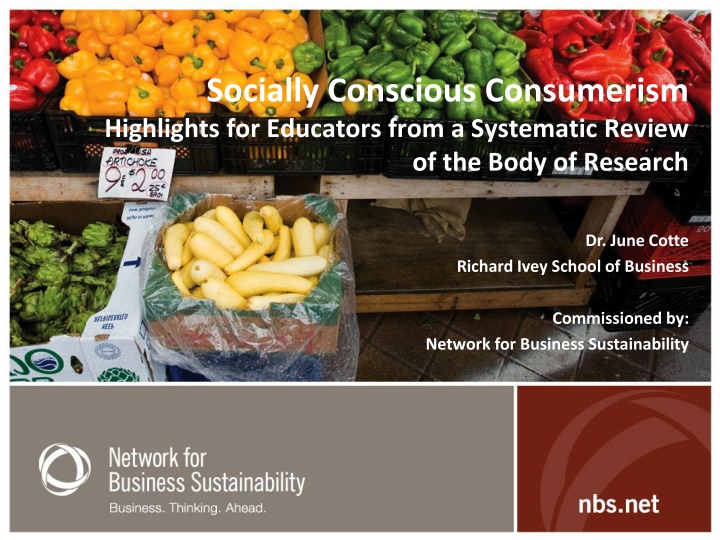
Socially Conscious Consumerism Insights for Educators
This systematic review of research by Dr. June Cotte delves into consumer willingness to reward firms for their CSR actions, key factors influencing consumer behavior, and the impact of socially conscious consumerism. The study analyzes various methodologies, consumer locations, and the importance of CSR in today's market landscape. Explore the Terra Bite Case Study and the implications for ethical behavior in consumer decisions.
Download Presentation

Please find below an Image/Link to download the presentation.
The content on the website is provided AS IS for your information and personal use only. It may not be sold, licensed, or shared on other websites without obtaining consent from the author. If you encounter any issues during the download, it is possible that the publisher has removed the file from their server.
You are allowed to download the files provided on this website for personal or commercial use, subject to the condition that they are used lawfully. All files are the property of their respective owners.
The content on the website is provided AS IS for your information and personal use only. It may not be sold, licensed, or shared on other websites without obtaining consent from the author.
E N D
Presentation Transcript
Socially Conscious Consumerism Highlights for Educators from a Systematic Review of the Body of Research Dr. June Cotte Richard Ivey School of Business Commissioned by: Network for Business Sustainability
The Terra Bite Case Study A case study (available here) was developed to support this project. It deals with voluntary consumer payment method The implicit assumption of the owners is ethical behaviour on the part of consumers, most of the time Another implicit assumption is that socially responsible consumers will pay enough of a premium to more than compensate for free-loaders The results of a knowledge project undertaken for the Network for Business Sustainability looked deep into the evidence underlying these and similar assumptions
Research Question and Approach Are consumers willing to reward firms for their positive CSR-related actions? if so, by how much? what factors influence whether they will? do they also punish (monetarily)?
What is CSR? Keywords searched: Organic products Local purchasing Recycling Slow food Socially conscious consumerism Environmental consumerism Social marketing Green consumption Cause-related marketing Eco-friendly products Paying for ethical behaviour Sustainable products / consumption Ethical firm behaviour Corporate social responsibility
What is included in the study? Search found nearly 1,700 academic articles and industry reports Excluded least relevant and worst quality studies Analyzed 91 articles on consumer willingness to pay for CSR initiatives
Results: Types of Studies Study Methodologies Over Time 100% 90% Unclear Meta-analysis Theory Archival Qualitative Experiment Survey 80% 70% 60% 50% 40% 30% 20% 10% 0%
Results: Location of Consumers Location of Consumers in Data 1% 2%1% United States 1% 5% Canada North America -unclear 20% Europe South America 57% Asia, not including Australia 6% Africa 7% Australia World
Results: Meaning of CSR Dimensions of CSR over time 100% Overall CSR 90% Overall consumer ethical level Animal rights 80% 70% 60% Other 50% Organic 40% Sourcing and/or production Cause-related/charity 30% 20% 10% Labor practices 0% Environmental/green
Results: Meaning of CSR Dimensions of CSR Measured Various Ways 60 50 Overall CSR Overall consumer ethical level 40 Animal rights Other 30 Organic Sourcing and/or production 20 Cause-related/charity Labor practices 10 Environmental/green 0 Attitudes (30%) Intentions (44%) Behaviors (18%) No measures described (8%)
Results: Consumer Willingness to Consumer Responses Dependent on Type of Measurement 88% Behaviors 44% 94% Intentions 61% Willing to Change Behavior (% of studies that asked) Willing to Pay Premium (% of studies that asked) 39% Attitudes 9%
Results: Attitudes Consumer Acceptance CSR Dimensions: Attitude-Based Studies 0% overall CSR 5% 0% consumer ethics 5% 0% animal rights 0% Percentage of studies showing willingness to pay premium 0% other 0% 3% organic 5% 3% sourcing 3% Percentage of studies showing willingness to change behavior 3% cause-related 5% 3% labor practices 3% 3% environment 13%
Results: Behaviours Consumer Acceptance CSR Dimensions: Behaviour-Based Studies 0% overall CSR 4% 4% consumer ethics 8% 8% animal rights Percentage of studies showing willingness to pay premium 8% 0% other 0% 8% organic 8% Percentage of studies showing willingness to change behavior 13% sourcing 13% 0% cause-related 0% 13% labor practices 17% 17% environment 38%
Results: Intentions Consumer Acceptance CSR Dimensions: Intention-Based Studies 2% overall CSR Percentage of studies showing willingness to pay premium 4% 2% consumer ethics 2% 5% Percentage of studies showing willingness to change behavior animal rights 5% 0% other 0% 9% organic 9% 14% sourcing 14% 4% cause-related 12% 9% labor practices 11% 23% environment 32%
Results: Intentions vs. Behaviours Studies Showing Willingness to Pay as Percentage Increase 8 studies measuring actual behaviors 7 6 studies measuring consumer intentions 5 4 3 2 1 0 5-9% 10-19% More than 20% Note: based on a small set of the total studies that included specific increases (13/91).
Conclusions Behavioural studies trump surveys Surveys yield wider range of results than observing consumer choices Attitude-Behaviour gap confirmed Intentions > behaviours Biggest gap on the environment: consumers are willing to change but not pay more Smallest gap on organic, ethical sourcing, and animal rights: fewer studies show willingness to change, but those that do also show that consumers are willing to pay more
Whats a Marketer to Do? assuming all else is constant, consumers are more likely to purchase from companies that engage in CSR actions, particularly in domains that consumers deem appropriate and personally relevant [but] little is constant in the real marketplace. (Du, Bhattacharya and Sen 2007) Messaging needs to position along the lines of there is no trade-off consumers expect the better alternative to be at least equal in price and quality to what they are already buying If you plan to charge a premium, messaging needs to revolve around other ways your offering saves money (the value in use argument from the B2B area)
Future Opportunities What influences consumers? We lack consensus on the profile of the socially conscious consumer and company: My final report will have a model of possible influences But we must better understand the influences and the gaps between attitudes, intentions, and behaviours Research in this area needs to be more rigorous. Price and quality are never equal, so let s not assume they are
Research Opportunities Enough surveys. We need better methods: Self-reported survey results simply are not up to the task of determining a price premium, or real marketplace behaviour Consumers often assume the socially conscious choice must be either more expensive, or not as effective More rigorous methods include conjoint, forced-choice, traditional experiments
Influences Gender, Age, Education SEC, Culture, Nation Social and Peer Influence Involvement Gov t Policy Willingness to Change behaviour Consumer Attitudes towards CSR Actions Consumer behavioural Intentions Firm CSR Actions Willingness to Pay a Premium Willingness to Punish Impediments: -Negative consumer attributions (why? greenwashing) -Effect on perceived quality -Negative perceptions of consumer efficacy -Consumer sacrifice Enhancements: -Positive perceptions of consumer efficacy -Acceptance of firm and consumer responsibility Impediments: -Competitive actions -Confusion at POP -Habit -Misleading packaging -Required trade-offs Enhancements: -Clear benefit -Prior small commitment -Consistency/fit with brand -Salience of issue -Simplified claims/labels -In-store education Impediments: -Contradictory firm actions -Prior negative consumer knowledge or attitude re: firm Enhancements: - Consumer knowledge of action -Consumer understanding -Prior positive consumer attitude re: firm -Company / issue fit Enhancements and Impediments

